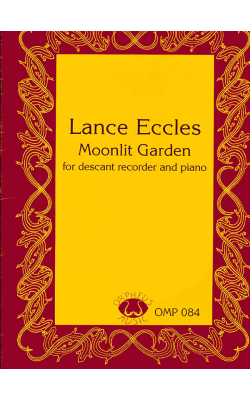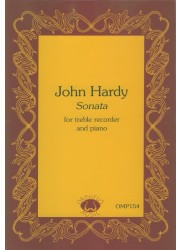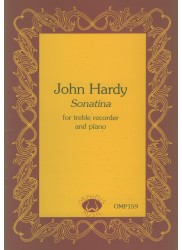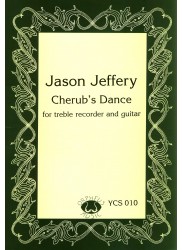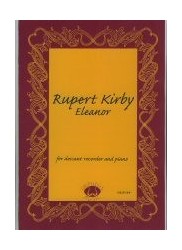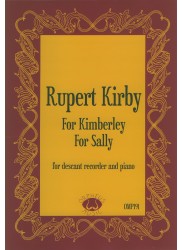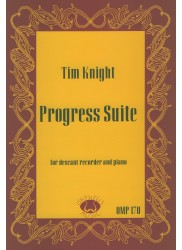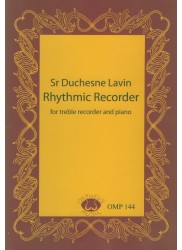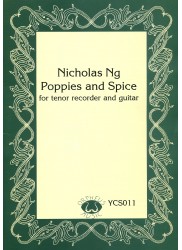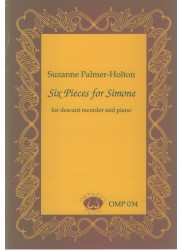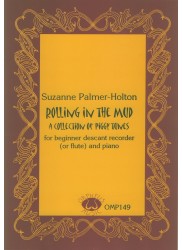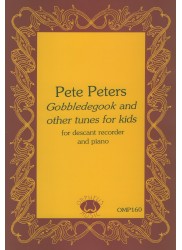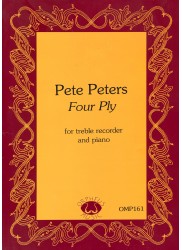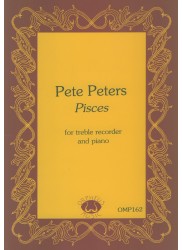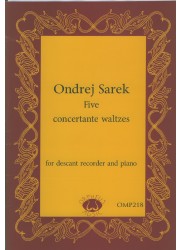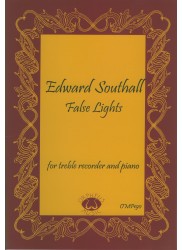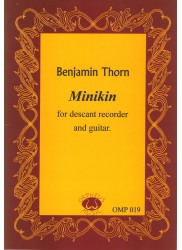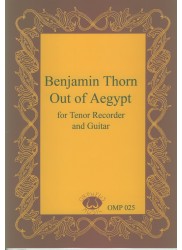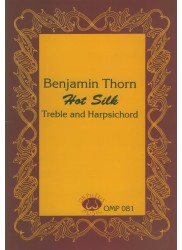No products
Prices are tax included
Moonlit Garden
Composer: Eccles - Lance
Instrumentation: Descant + Piano
Period/genre: Australian Contemporary
Grade: Moderate - Difficult
More info
*Contemporary Piece.* Attractive flowing melody.
1. Moonlit Garden
_Score 4 pp. Descant part 1 pp._
https://orpheusmusic.com.au/1-accompaniment/1919-moonlit-garden.html?search_query=omp084&results=2OMP084 Lance Eccles Moonlit Garden
This is an attractively lyrical piece for the descant recorder player of about grade 5-6 level, and whose accompaniment is also accessible for the less proficient pianist. It makes use of the middle and upper range of the instrument up to top B flat. Presentation of score is clear and the recorder part fits onto the single page.
Alison Baldwin, The Recorder Magazine Winter 2002 Vol. 22 no. 4
OMP099 Donald Bousted New Horizon: Five Easy Pieces for Alto Recorder and Piano or Harpsichord
OMP084 Lance Eccles Moonlit Garden
OMP068 Beverley Lea Through the Trees
OMP079 Richard Peter Maddox Birthday Piece
Based in Australia, a country where there is a thriving recorder culture, Orpheus Music has provided a steady and welcome stream of editions of music for recorder in many different styles for several years now. These four new editions provide a cross-section of the publisher's offerings.
All four of these works feature intriguing titles that make frequent reference to nature. Through the Trees and Moonlit Garden are most obviously evocative, although two of the five short pieces in Donald Bousted's New Horizon are similarly titled "Floating Through Mist" and "Boats on a Painted Sea."
Beverlev Lea's Through the Trees for solo bass recorder is described as a "strongly rhythmic piece," and the main theme is in a striding 6/8 with interjections in 2/4 and 3/4 - certainly suggesting a good brisk walk in the woods. A more cantabile middle section provides an effective contrast and makes a satisfying ABA structure for the work. The piece makes good use of both the jolly bassoon-like character of the bass recorder as well as its ability to sing in the upper register. The piece is quite approachable both musically and technically, and would be especially rewarding for an intermediate player wanting to explore the finer points of playing the bass.
Moonlit Garden is a more conventional piece. The texture throughout is made up of gently rocking broken chords in the piano supporting a sustained melody in the soprano recorder. There is a middle section that changes key and mood somewhat, though still adhering to the same basic texture, and a coda that brings the piece to a close in four flats and in the recorder's high register. While the overall effect is attractive, the recorder is not really used to its best advantage, and some of the harmonic transitions are not as convincing as they might be. This will be for the curious and those who would enjoy the piece's uncomplicated directness of expression.
Richard Peter Maddox's Birthday Piece paints a picture of a different sort. Maddox is a composer and educator residing in Armidale who describes his piece as having been "written for Karyn Ashley [perhaps one of his students] whose ambition is to find music that is as difficult and fast as possible." The piece starts and ends in a slow, improvisatory mood, framing a fast-moving, jazzy dance that features plenty of accidentals and leaping sixteenths. While catering nicely to the taste of the dedicatee (one can easily envision her delightedly practising her birthday present), there is a certain awkwardness to some of the figures in the dance and in the greatly contrasting moods of the three sections. The piece is probably best considered as a challenging, yet engaging, study in quick-note motion.
The most substantial of the pieces here, and the most difficult is Donald Bousted's collection New Horizon subtitled "five easy pieces for alto recorder and piano or harpsichord". For a composer best-known for his microtonal writing, these might well be considered easy pieces, but in the course of this collection performers will encounter passages of two against three against four between the two hands of the piano and the recorder, syncopated eighths and sixteenths at a crotchet = 108, as well as some very precise dynamic balances between the recorder and piano. All of these challenges are well worth conquering, however, since Bousted's ear for colour and texture is very acute and is put to good use here. Despite the stated option of using harpsichord, the piano is really necessary to make the most of the keyboard part.
The presentation of these editions is clear and attractive with just a couple of missing cautionary accidentals in the recorder part of the Bousted.
Scott Paterson, American Recorder, March 2004
30 other products in the same category:
Reference: OMP154
Brand: Orpheus Music
Sonata
Composer: Hardy - John Instrumentation: Treble + Piano Period/genre:...
In StockReference: OMP154.pdf
Brand: Orpheus Music
Sonata
PLEASE NOTE - DOWNLOADABLE PDF VERSION Composer: Hardy - John...
$23.50 -20%In StockReference: OMP159
Brand: Orpheus Music
Sonatina
Composer: Hardy - John Instrumentation: Treble + Piano Period/genre:...
In StockReference: OMP159.pdf
Brand: Orpheus Music
Sonatina
PLEASE NOTE - DOWNLOADABLE PDF VERSION Composer: Hardy - John...
$19.00 -20%In StockReference: YCS010
Brand: Orpheus Music
Cherub's Dance
Composer: Jeffery - Jason Instrumentation: Treble + Guitar Period/genre:...
In StockReference: YCS010.pdf
Brand: Orpheus Music
Cherub's Dance
PLEASE NOTE - DOWNLOADABLE PDF VERSION Composer: Jeffery - Jason...
$16.00 -20%In StockReference: OMP184
Brand: Orpheus Music
Eleanor
Composer: Kirby - Rupert Instrumentation: Descant + Piano Period/genre:...
In StockReference: OMP184.pdf
Brand: Orpheus Music
Eleanor
PLEASE NOTE - DOWNLOADABLE PDF VERSION Composer: Kirby - Rupert...
$14.50 -20%In StockReference: OMP191
Brand: Orpheus Music
For Kimberley and For Sally
Composer: Kirby - Rupert Instrumentation: Descant + Piano Period/genre:...
In StockReference: OMP191.pdf
Brand: Orpheus Music
For Kimberley and For Sally
PLEASE NOTE - DOWNLOADABLE PDF VERSION Composer: Kirby - Rupert...
$16.00 -20%In StockReference: OMP170
Brand: Orpheus Music
Progress Suite
Composer: Knight - Tim Instrumentation: Descant + Piano Period/genre:...
In StockReference: OMP170.pdf
Brand: Orpheus Music
Progress Suite
PLEASE NOTE - DOWNLOADABLE PDF VERSION Composer: Knight - Tim...
$16.00 -20%In StockReference: OMP144.pdf
Brand: Orpheus Music
Rhythmic Recorder
PLEASE NOTE - DOWNLOADABLE PDF VERSION Composer: Lavin - Sr Duchesne...
$17.50 -20%In StockReference: YCS011
Brand: Orpheus Music
Poppies and Spice
Composer: Ng - Nicholas Instrumentation: Tenor + Guitar Period/genre:...
In StockReference: OMP034
Brand: Orpheus Music
Six Pieces for Simone
Composer: Palmer-Holton - Suzanne Instrumentation: Descant + Piano...
In StockReference: OMP149
Brand: Orpheus Music
Rolling in the Mud
Composer: Palmer-Holton - Suzanne Instrumentation: Descant + Piano...
In StockReference: OMP034.pdf
Brand: Orpheus Music
Six Pieces for Simone
PLEASE NOTE - DOWNLOADABLE PDF VERSION Composer: Palmer-Holton - Suzanne...
$14.50 -20%In StockReference: OMP160
Brand: Orpheus Music
Gobbledegook and other tunes for kids
Composer: Peters - Pete Instrumentation: Descant + Piano Period/genre:...
In StockReference: OMP161
Brand: Orpheus Music
Four Ply
Composer: Peters - Pete Instrumentation: Treble + Piano Period/genre:...
In StockReference: OMP162
Brand: Orpheus Music
Pisces
Composer: Peters - Pete Instrumentation: Treble + Piano Period/genre:...
In StockReference: OMP218
Brand: Orpheus Music
Five Concertante Waltzes
Composer: Sarek - Ondrej Instrumentation: Descant + Piano Period/genre:...
In StockReference: OMP218.pdf
Brand: Orpheus Music
Five Concertante Waltzes
PLEASE NOTE - DOWNLOADABLE PDF VERSION Composer: Sarek - Ondrej...
$20.50 -20%In StockReference: OMP190
Brand: Orpheus Music
False Lights
Composer: Southall - Edward Instrumentation: Treble + Piano Period/genre:...
In StockReference: OMP190.pdf
Brand: Orpheus Music
False Lights
PLEASE NOTE - DOWNLOADABLE PDF VERSION Composer: Southall - Edward...
$16.00 -20%In StockReference: OMP019
Brand: Orpheus Music
Minikin
Composer: Thorn - Benjamin Instrumentation: Descant + Guitar Period/genre:...
In StockReference: OMP019.pdf
Brand: Orpheus Music
Minikin
PLEASE NOTE - DOWNLOADABLE PDF VERSION Composer: Thorn - Benjamin...
$14.50 -20%In StockReference: OMP025
Brand: Orpheus Music
Out of Aegypt
Composer: Thorn - Benjamin Instrumentation: Treble/Tenor + Guitar...
In StockReference: OMP025.pdf
Brand: Orpheus Music
Out of Aegypt
PLEASE NOTE - DOWNLOADABLE PDF VERSION Composer: Thorn - Benjamin...
$16.00 -20%In StockReference: OMP081
Brand: Orpheus Music
Hot Silk
Composer: Thorn - Benjamin Instrumentation: Treble + Harpsichord...
In StockReference: OMP081.pdf
Brand: Orpheus Music
Hot Silk
PLEASE NOTE - DOWNLOADABLE PDF VERSION Composer: Thorn - Benjamin...
$17.50 -20%In Stock

